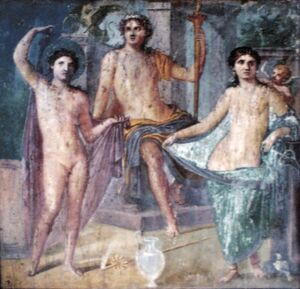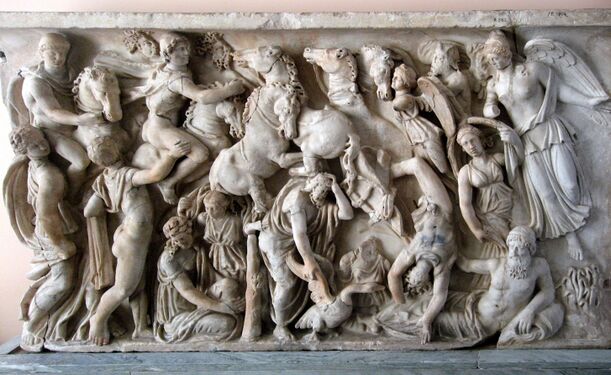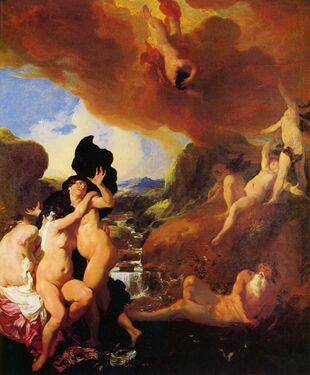فايثون
| Phaethon | |
|---|---|
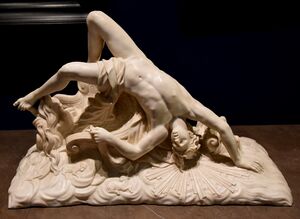 The Fall of Phaeton Statue. Marble, circa 1700–1711. By Dominique Lefevre. From Paris, France. The Victoria and Albert Museum, London | |
| معلومات شخصية | |
| الأبوان | Helios and Clymene |
| الأشقاء | the Heliades |
| القرين | Cycnus (lover) |
Phaethon (/ˈfeɪ.əθən/; باليونانية قديمة: Φαέθων, Phaéthōn, تـُنطق [pʰa.é.tʰɔːn]), also spelled Phaëthon, was the son of the Oceanid Clymene and the sun god Helios in Greek mythology. His name was also used by the Ancient Greeks as an alternative name for the planet Jupiter,[1] the motions and cycles of which were personified in poetry and myth.
In most authors, Phaethon is the son of Helios, and out of desire to have his parentage confirmed, travels to the sun-god's palace in the east. There he is recognised by his father, and asks him for the privilege to drive his chariot for a single day. Despite Helios' fervent warnings and attempts to talk him out of it, counting the numerous dangers he would face in his celestial journey and reminding Phaethon that only he can control the horses, the boy is not dissuaded and does not change his mind. He is then allowed to take the chariot's reins; his ride is disastrous, as he cannot keep a firm grip on the horses. As a result, he drives the chariot too close to the earth, burning it, and too far from it, freezing it. In the end, after many complaints, from the stars in the sky to the earth itself, Zeus strikes Phaethon with one of his lightning bolts, killing him instantly. His dead body falls into the river Eridanus, and his sisters the Heliades are turned to black poplar trees as they mourn him.
Phaethon's tale was commonly used to explain why inhabitable lands on both sides of extremity (such as hot deserts and frozen wastelands) exist, and why certain peoples have darker complexions, while his sisters' amber tears accounted for the river's rich deposits of amber.
Mythology
Family
Phaethon was said to be the son of the Oceanid Clymene and the sun god Helios.[2][3] Alternatively, less common genealogies make him a son of Clymenus by Oceanid Merope,[4] of Helios and Rhodos (thus a full brother of the Heliadae)[5] or of Helios and Prote.[6]
Details vary according to version, but most have Phaethon travel far east to meet his father, sometimes in order to get him to assure his paternity. There, he asks Helios for permission to drive his father's sun-chariot for a single day. Despite Helios' protests and advice against, Phaethon doesn't back down from his initial wish, and thus Helios reluctantly allows him to drive his chariot. Placed in charge of the chariot, Phaethon was unable to control the horses. In some versions, the Earth first froze when the horses climbed too high, but when the chariot then scorched the Earth by swinging too near, Zeus decided to prevent disaster by striking it down with a thunderbolt. Phaethon fell to earth and was killed in the process.[7][8]
Euripides' Phaethon
A few fragments of Euripides' tragedy on this subject survive. According to an ancient summary, Clymene (who had claimed that her lawful husband Merops was the father of her son Phaethon, the product of an illicit affair) revealed to Phaethon that he was the child of Helios, rather than her husband. It's been suggested that Clymene made this revelation to Phaethon in order to overcome his reluctance to get married; the greatest problem of the fragmentary plot is the identity of Phaethon's wife. H. Weil suggested it is one of Phaethon's half-sisters, the Heliades, and James Diggle noted that while this suggestion is unprovable, he is convinced that it is correct. Clymene convinces him to go seek out his father. Thus Phaethon travels to the east, so that Helios can confirm his true parentage.[9] In surviving fragments, Phaethon drives the solar chariot as his father, accompanying him in his celestial journey riding on (perhaps) horse (named Sirius), tries to guide him.[10] After Phaethon's disastrous ride, near the end Clymene mourns her son, and orders slave girls to bring Phaethon's still smoking dead body in the palace and hide it from Merops, while lamenting Helios' role in his demise.[11] Merops discovers his son's charred corpse, and the truth, a bit later. In reconstructing the lost play and discussing the fragments, James Diggle has discussed the treatment of the Phaethon myth (Diggle 2004).
Plato's Timaeus
In Plato's Timaeus, Critias tells the story of Atlantis as recounted to Solon by an Egyptian priest, who prefaced the story by saying:
There have been, and will be again, many destructions of mankind arising out of many causes; the greatest have been brought about by the agencies of fire and water, and other lesser ones by innumerable other causes. There is a story that even you [Greeks] have preserved, that once upon a time, Phaethon, the son of Helios, having yoked the steeds in his father's chariot, because he was not able to drive them in the path of his father, burnt up all that was upon the earth, and was himself destroyed by a thunderbolt. Now, this has the form of a myth, but really signifies a declination of the bodies moving in the heavens around the earth, and a great conflagration of things upon the earth, which recurs after long intervals.[12]
The Fall of Phaëthon on a Roman sarcophagus (Hermitage Museum)
Apollonius Rhodius' Argonautica
While sailing up the Eridanus river on their way back, the Argonauts reach the outfall of the deep lake where Phaethon fell after he was struck with a lightning bolt. During the day, the crew of the Argo was tormented by the nauseating stench from Phaethon's corpse, still smouldering after all this time, and at night they had to listen to the lament of his sisters, now turned into poplar trees and shedding tears of amber.[13]
Diodorus Siculus' Historic Library
Phaethon, the son of Helios, while still a youth persuaded his father to retire for a single day and give to him his chariot. His father eventually yielded to his son's wishes, and gave him his quadriga. The boy was unable to control the reins, and the horses left their accustomed course, setting ablaze the Heavens (creating the Milky Way) and the Earth (creating uninhabitable land) alike. Zeus, seeing the catastrophe, smote Phaethon with a thunderbolt and brought the sun to its course. Phaethon fell into the Eridanus river, dead. His sisters mourned him, and turned into black poplar trees.[14]
Ovid's Metamorphoses
In the version of the myth told by Ovid in the Metamorphoses, Phaethon is the son of Clymene and the sun-god Sol, who would often boast about being the son of the sun-god. Phaethon, challenged by Epaphus and his playmates, sought assurance from his mother that his father was Sol indeed. She gave him the requested assurance and told him to turn to his father for confirmation. He asked his father for some proof that would demonstrate his relationship with the sun. When the god swore by the river Styx to grant him whatever he wanted, he insisted on being allowed to drive the sun chariot for a day. Sol tried to talk him out of it by telling him that not even Jupiter (the king of the gods) would dare to drive it, as the chariot was fiery hot and the horses breathed out flames. He said:
The first part of the track is steep, and one that my fresh horses at dawn can hardly climb. In mid-heaven it is highest, where to look down on earth and sea often alarms even me and makes my heart tremble with awesome fear. The last part of the track is downwards and needs sure control. Then even Tethys herself, who receives me in her submissive waves, is accustomed to fear that I might dive headlong. Moreover, the rushing sky is constantly turning, and drags along the remote stars, and whirls them in rapid orbits. I move the opposite way, and its momentum does not overcome me as it does all other things, and I ride contrary to its swift rotation. Suppose you are given the chariot. What will you do? Will you be able to counter the turning poles so that the swiftness of the skies does not carry you away? Perhaps you conceive in imagination that there are groves there and cities of the gods and temples with rich gifts. The way runs through the ambush, and apparitions of wild beasts! Even if you keep your course, and do not steer awry, you must still avoid the horns of Taurus the Bull, Sagittarius the Haemonian Archer, raging Leo and Lion's jaw, Scorpio's cruel pincers sweeping out to encircle you from one side, and Cancer's crab-claws reaching out from the other. You will not easily rule those proud horses, breathing out through mouth and nostrils the fires burning in their chests. They scarcely tolerate my control when their fierce spirits are hot, and their necks resist the reins. Beware, my boy, that I am not the source of a gift fatal to you, while something can still be done to set right your request![15]
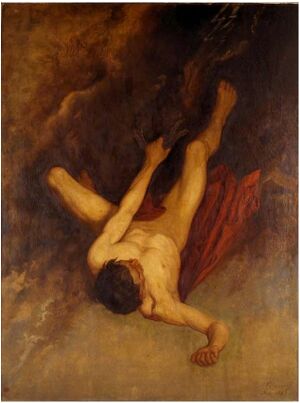
Phaethon, however, was adamant, and thus Sol was forced to relent. When the day came, the fierce horses that drew the chariot felt that it was empty because of the lack of the sun-god's weight and went out of control. Terrified, Phaethon dropped the reins. The horses veered from their course, scorching the earth, burning the vegetation, bringing the blood of the Ethiopians to the surface of their skin and so turning it black, changing much of Africa into a desert, drying up rivers and lakes and shrinking the sea. Earth cried out to Jupiter who was forced to intervene by striking Phaethon with a lightning bolt. Like a falling star, Phaethon plunged blazing into the river Eridanus.
The epitaph on his tomb was:
- Here Phaethon lies who in the sun-god's chariot fared. And though greatly he failed, more greatly he dared.[16]
Sol, stricken with grief at his son's death, at first refused to resume his work of driving his chariot, but at the appeal of the other gods, including Jupiter, returned to his task.
Phaethon was the good friend or lover of Cycnus of Liguria, who profoundly mourned his death and was turned into a swan. Even as a swan he retained memories of Phaethon's fiery demise, and would avoid the sun's heat due to that.[17][18] Phaethon's seven sisters, the Heliades, also mourned his loss, keeping vigil where Phaethon fell to Earth until the gods turned the sisters into poplar trees, and their tears into amber.[19]
Hyginus' Fabulae and Astronomica
In his Fabulae, Hyginus records two versions, one of which he attributes to Hesiod.
In the first, Phaethon is the son of the sun-god Sol and Clymene, who secretly mounted his father's car without his leave. Being inexperience, he flew too high and then too low, until Jupiter stroke him with his lightning. Jupiter then, pretending to want to put out the fire, let loose all the rivers everywhere, causing the flood that drowned everyone except for Deucalion and Pyrrha. Phaethon's sisters then turned to black poplars, for yoking the chariot against their father's orders.[20]
In the second, according to Hesiod (an attribution even the strongest believers of Hyginus find hard to accept[21]), Phaethon was instead a grandson to Sol through his son Clymenus, and the name of Phaethon's mother is Merope, an Oceanid. Phaethon, once he learns that his grandfather is the Sun, asks to drive his chariot for a day, with disastrous results. Like in other versions, his sisters mourn him and are turned into poplar trees, and Cygnus of Liguria into a swan.[22]
After his death, he was conveyed to the stars by his father as a constellation.[23]
Clement of Alexandria's Stromata
According to Clement of Alexandria in his Stromata, "...in the time of Crotopus occurred the burning of Phaethon, and the deluges of Deucalion.[24]
Suetonius' The Twelve Caesars
In The Twelve Caesars, Suetonius attributes to the emperor Tiberius the following repeated remark about the future emperor Gaius Caligula: "That to allow Gaius to live would prove the ruin of himself and of all men, and that he was raising a viper for the Roman people and a Phaethon for the world".[25]
Virgil's Aeneid
In his Aeneid, Virgil briefly alludes Phaethon's fiery ride in his mention of Cycnus of Liguria who wept for his lover well into his old age next to the poplar trees that were once Phaethon's sisters the Heliades; upon his transformation, his by now white hair became his swan form's white feathers.[26]
Servius' Commentary on the Aeneid
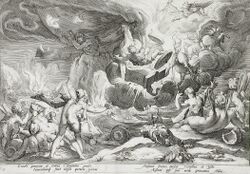
In his commentary of Virgil's Aeneid, Servius wrote that Phaethon was the son of Sol and Clymene; Epaphus, the king of Egypt, mocked Phaethon of having been born of adultery, so the boy travelled east to meet his father and confirm his parentage. Sol confirmed the truth, and sworn on the river Styx; Phaethon then asked him to drive his chariot for a day. Sol then agreed, not being able to take his word back, and Phaethon took his chariot. However he set the earth on fire and Jupiter killed him with a lightning bolt. His two sisters, Phaethusa and Lampetia, mourned his death and were transformed by the gods into black poplar trees. His lover, Cycnus also lamented bitterly his death, and was changed by Apollo into a swan and afterwards into a constellation (Cygnus).[27]
Lucian's True Story and Dialogues of the Gods
In the True History by the satirical Greek writer Lucian of Samosata, Phaethon is the king of the sun and is at war with the Moon, ruled by King Endymion.
In his Dialogues of the Gods, Zeus angrily berates Helios for letting his inexperienced son drive his chariot, which almost resulted in the world being destroyed. Helios acknowledges his error, but claims he was pressured by Phaethon and Phaethon's mother Clymene both, and could have not foreseen the extent of the disaster; Zeus is displeased to hear it, unconvinced that he would not know that an inexperienced driver like Phaethon would not be able to control the steeds. Helios then asks Zeus to be merciful, as his son has already been punished (being dead) and he himself is in great mourning. Zeus disagrees that this punishment is enough, returns Helios his damaged chariot which is in need of repair, and threatens to strike him with one of his thunderbolts should he ever do such thing again.[28]
Philostratus' Imagines
Philostratus, who follows the typical premise of Phaethon's tale (son of Helios who asks his father to drive his chariot and ends up burning the earth) describes in great detail the extent of the catastrophe; the Night drives away the Day from the noonday sky, the sun's orb plunges into the earth pulling the stars along with him, the Seasons abandon their posts in fear, and the Earth raises her hands in supplication as she burns. In the end Phaethon falls from the chariot, himself on fire too, and dies. The Eridanus mourns him along with the Heliades.[29]
Quintus Smyrnaeus' Posthomerica

In his Posthomerica, Quintus Smyrnaeus wrote that "The Daughters of the Sun, the Lord of Omens, shed (tears) for Phaethon slain, when by Eridanos' flood they mourned for him. These, for undying honour to his son, the god made amber, precious in men's eyes."[30]
Nonnus' Dionysiaca
In Nonnus' version in his epic Dionysiaca, Helios and Clymene get married, and together they have Phaethon. Phaethon is raised by his parents, in the company of Oceanus and the Oceanid nymphs. As a boy, he would mimic his father and his daily journey by driving a wagon of his own design, with burning torches standing in for the fire. When he grows up, he begs his father to let him drive his chariot, but Helios refuses, arguing that sons are not necessarily fit to follow on their fathers' footsteps (bringing up how Ares, Hephaestus, Apollo and Hermes do not hold lightning bolts like their father Zeus). Phaethon then pressures him more, as does Clymene; with great reluctance, Helios consents, and gives his son a detailed speech about the dangers and the hazards of the ride. He then dresses Phaethon up in his own robes, helmet and solar crown and gives him the reins. With a final warning from his father, Phaethon yokes the horses and ascends in the sky. Like in all other versions, his ride is a disaster, as he burns the earth. Zeus then kills him with a lightning bolt, and places him among the stars as the constellation Auriga.[31]
Scholiast on the Odyssey
According to a scholiast on the Odyssey, Helios had Phaethon and the Heliades (namely Phaethusa, Lampetia, Aegle) by Rhodos, whom he calls the daughter of the river god Asopus. When Phaethon grew up and learning from his mother that his father was Helios, he travelled to his father's halls; his father acknowledged him and Phaethon asked from him leave to drive his own chariot. At first Helios refused, knowing how dangerous it would be, but because Phaethon kept pressing him, in the end he gave him the reins. But he drove irresponsibly, and thus Zeus struck him with one of his lightning bolts, and Phaethon fell dead on the river Eridanus. His three sisters lamented him, and Zeus out of pity turned them into poplar trees, as they cried amber tears, explaining the presence of amber in the river.[5]
Other ancient writers
Aeschylus also wrote a play, the Heliades, about Phaethon's tale, of which only few fragments survive.
Post-classical works
- Dante refers to the episode in the Inferno, in "Purgatorio" Canto IV and Paradiso Canto XVII of his Divine Comedy.
- William Shakespeare uses the story of Phaethon in four places, most famously as an allegory in his play Richard II. He also makes Juliet wish "Phaëthon would whip [Phoebus's horses] to the west" as she waits for Romeo in Romeo and Juliet 3.2.3.[32] It also appears briefly in The Two Gentlemen of Verona 3.1.154, and twice in Henry VI, Part 3 (1.4.33 and 2.6.12)[33]
- John Marston includes reference to Phaeton in The Malcontent whereby Mendoza's monologue describes the '...sparkling glances (of women), ardent as those flames that singed the world by heedless Phaeton!' – Act 1, Scene 5
- Jean-Baptiste Lully wrote a musical tragedy, Phaëton, in which he referred indirectly to the fate of Nicolas Fouquet, whose ambitions to imitate Louis XIV – The Sun King – brought about his downfall. This opera is also used in the second version of Paul Hindemith’s opera Cardillac (1952).
- Camille Saint-Saëns wrote a symphonic poem entitled Phaéton in 1873.
- Niccolò Jommelli wrote an opera Fetonte to an Italian-language libretto by Mattia Verazi using various sources, principally Ovid, for the myth of Phaeton. It was first performed at the Ducal Theatre, Ludwigsburg in February, 1768, where Duke Karl-Eugen of Württemberg maintained an opera troupe.
- Wilhelm Waiblinger’s epistolary novel Phaëthon amalgamates the Phaethon myth with Goethe’s Werther as well as Hölderlin’s Hyperion.
- Johann Wolfgang Goethe published a poetic reconstruction of Euripides’ fragmented tragedy in Kunst und Altertum (1823), which served as a basis for various full-scale dramatic adaptations such as Marie Wernicke’s Phaethons Sturz (1893), Karl Wilhelm Geißler’s Phaëthon (1889) and Arnold Beer’s Phaeton (1875).
- Gerhart Hauptmann’s long poem Helios und Phaethon (1936) omits the cosmic disaster in order to focus on the relationship between godly father and mortal son.
- In Otakar Theer's symbolist tragedy Faëthón (1916), the hero epitomizes man's revolt against the world order ("the gods") and against human destiny. The tragedy was adapted in 1962 into a celebrated eponymous radio play by Miloslav Jareš (director) and Jaromír Ptáček (dramaturge).[34]
- Paul Goodman’s early Phaëthon, Myth (1934) juxtaposes the Phaethon myth with a grotesque version of a Christological narrative.
- Benjamin Britten’s Six Metamorphoses after Ovid for oboe, first performed at the Aldeburgh Festival on 14 June 1951, include the short piece Phaeton, which as a solo piece seems to focus on the individual lost in space rather than the furious effects emphasised by earlier instrumental renditions of the myth.
- In Ayn Rand's 1957 novel Atlas Shrugged, an in-universe opera is composed by the character of Richard Halley where Phaeton succeeds in his attempt to control the chariot of the sun, as an allegory for the power of mankind and individualism.
- Donald Cotton wrote a comedy radio play 'The Tragedy of Phaethon' broadcast on BBC Network 3 on 10 February 1965.[35]
- Angus Wilson’s novel Setting the World on Fire (1980) opens with the description of a Phaethon painting which proves pivotal to the protagonist's emerging self-conception, leading up to his production of Lully’s Phaëton.
- John C. Wright's The Golden Oecumene Trilogy (2002) features a protagonist named Phaethon, whose father's name is Helion. Mythical references abound.[36]
- In 2002, Volkswagen introduced the VW Phaeton.
- In 2012, former Disco Inferno frontman Ian Crause adapted the story of Phaethon as The Song of Phaethon for his first musical release in over a decade. Crause used the story as an analogy for Britain's entry into the Second Gulf War.[37]
- in 2016 Taffety Punk Theatre premiered Michael Milligan's play "Phaeton" in Washington, DC.[38]
The name "Phaethon", which means "Shining One",[39] was given also to Phaethon of Syria, to one of the horses of Eos (the Dawn), the Sun, the constellation Auriga, and the planet Jupiter, while as an adjective it was used to describe the sun and the moon.[40] In some accounts the planet referred to by this name is not Jupiter but Saturn.[41]
When 1 Ceres and 2 Pallas – the first asteroids – were discovered, astronomer Heinrich Olbers suggested that they were fragments of a much larger planet which was later named for Phaethon. However, the Phaeton hypothesis has been superseded by the accretion model, in which the asteroid belt represented the remainder of the protoplanetary disk that never formed a planet due to the gravity of Jupiter. However, fringe theorists still consider the Phaeton hypothesis likely.
In modern times, an asteroid whose orbit brings it close to the sun has been named "3200 Phaethon" after the mythological Phaethon.
The French form of the name "Phaethon" is "Phaéton". This form of the word is applied to a kind of carriage and automobile.[42][43]
An order, family, and genus of birds bear the name Phaethon in their taxonomic nomenclature, the tropicbirds.
The fall of Phaethon, Johann Liss, early 17th century
Genealogy
| Gaia | |||||||||||||||||||||||||||||
| Uranus | |||||||||||||||||||||||||||||
| Hyperion | Theia | Oceanus | Tethys | ||||||||||||||||||||||||||
| Helios | Clymene | ||||||||||||||||||||||||||||
| PHAETHON | |||||||||||||||||||||||||||||
See also
- Bellerophon
- Icarus
- Lucifer
- "Phaeton: The Chariot of Fire" episode
Notes
- ^ Cicero, De Natura Deorum.
- ^ Oxford Dictionaries, "Phaethon"
- ^ Collins English Dictionary, "Phaethon"
- ^ Hyginus, Fabulae 154
- ^ أ ب Scholia on Homer, Odyssey 17.208
- ^ Tzetzes, Chiliades 4.127
- ^ Gunnell, John A. (ed.). Standard Catalog of American Cars 1946–1975 (Second ed.). krause publications. p. 14.
...okay to borrow the chariot of the Sun for a day.
- ^ Olivia E. Coolidge, Greek Myths (Houghton Mifflin Harcourt 2001 ISBN 978-0-61815426-5), pp. 12–17
- ^ Hugh Lloyd-Jones, The Classical Review Vol. 21, No. 3 (Dec., 1971), pp. 341–345
- ^ Euripides, Phaethon fr. 779 (p. 348).
- ^ Phaethon fr 781 N²; surviving fragments of the tragedy can be found in Greek here
- ^ Translation by Benjamin Jowett (1817–1893) reproduced in, for example, John Michael Greer, Atlantis (Llewelyn Worldwide 2007 ISBN 978-0-73870978-9), p. 9
- ^ Apollonius Rhodius, Argonautica 4.596-610; 4.620-626
- ^ Diodorus Siculus, Library of History 5.23.1–2
- ^ A.S. Kline's translation of Ovid, Metamorphoses
- ^ Edith Hamilton, Mythology: Timeless Tales of Gods and Heroes, ISBN 0-446-60725-8
- ^ Ovid, Metamorphoses 2.367–380
- ^ Menoni, Burton (2016). Kings of Greek Mythology. ISBN 9781329854277.
- ^ "Phaethon in Greek Mythology". Greek Legends and Myths (in الإنجليزية).
- ^ Hyginus, Fabulae 152A
- ^ Diggle, pp 22–23
- ^ Hyginus, Fabulae 154
- ^ Hyginus, De Astronomica 2.42.2
- ^ "Clement of Alexandria: Stromata, Book 1". Earlychristianwritings.com. 2006-02-02. Retrieved 2010-08-11.
- ^ Suetonius, Lives of the Caesars (Barnes & Noble 2004 ISBN 978-0-76075758-1), p. 115
- ^ Virgil, Aeneid 10.189
- ^ Servius Commentary on Virgil's Aeneid 10.189
- ^ Lucian, Dialogues of the Gods Zeus and the Sun
- ^ Philostratus, Imagines 1.11.1
- ^ Quintus Smyrnaeus, Posthomerica 5.300
- ^ Nonnus, Dionysiaca 38.142–435
- ^ Text of Romeo and Juliet
- ^ Merrix, Robert P (1987). "The Phaëton Allusion in Richard II: The Search for". English Literary Renaissance. 17 (3): 277–287. doi:10.1111/j.1475-6757.1987.tb00937.x. JSTOR 43447224.
- ^ Pekárek, Hynek. "Otakar Theer: Faëthón" (in التشيكية). Rozhlas.cz. Retrieved 2013-03-13.
- ^ BBC Genome
- ^ Wright, John C. (20 April 2002). The Golden Age. ISBN 0765336693.
- ^ Pitchfork: 'Listen: Ian Crause of Disco Inferno Shares First New Music in Over a Decade'
- ^ See
- ^ Liddell and Scott, φαέθω
- ^ Liddell and Scott: Φαέθω
- ^ Theoi Greek Mythology, "Phaethon"
- ^ Oxford Dictionaries: "phaeton"
- ^ Collins English Dictionary: "phaeton"
References
Greek
- Euripides. Fragments: Oedipus-Chrysippus: Other Fragments, edited and translated by Christopher Collard, Martin Cropp, Loeb Classical Library No. 506. Cambridge, Massachusetts, Harvard University Press, 2008. ISBN 978-0-674-99631-1. Online version at Harvard University Press.
- Apollonius Rhodius, Argonautica translated by Robert Cooper Seaton (1853–1915), R. C. Loeb Classical Library Volume 001. London, William Heinemann Ltd, 1912. Online version at the Topos Text Project.
- Diodorus Siculus, Bibliotheca Historica. Vol 1–2. Immanel Bekker. Ludwig Dindorf. Friedrich Vogel. in aedibus B. G. Teubneri. Leipzig. 1888–1890. Greek text available at the Perseus Digital Library.
- Tzetzes, John, Book of Histories, Book II–IV translated by Gary Berkowitz from the original Greek of T. Kiessling's edition of 1826. Online version at Theoi.com
- Philostratus the Elder, Imagines, translated by A. Fairbanks, Loeb Classical Library No, 256. Harvard University Press, Cambridge, Massachusetts. 1931. ISBN 978-0674992825. Internet Archive
- Quintus Smyrnaeus, Quintus Smyrnaeus: The Fall of Troy, translated by A.S. Way, Cambridge, Massachusetts, Harvard University Press, 1913. Internet Archive.
- Nonnus, Dionysiaca; translated by Rouse, W H D, III Books XXXVI–XLVIII. Loeb Classical Library No. 346, Cambridge, Massachusetts, Harvard University Press; London, William Heinemann Ltd. 1940. Internet Archive.
- Lucian, Dialogues of the Gods; translated by Fowler, H W and F G. Oxford: The Clarendon Press. 1905.
Roman
- Ovid. Metamorphoses, Volume I: Books 1–8. Translated by Frank Justus Miller. Revised by G. P. Goold. Loeb Classical Library No. 42. Cambridge, Massachusetts: Harvard University Press, 1977, first published 1916. ISBN 978-0-674-99046-3. Online version at Harvard University Press.
- Gaius Julius Hyginus, Astronomica from The Myths of Hyginus translated and edited by Mary Grant. University of Kansas Publications in Humanistic Studies. Online version at the Topos Text Project.
- Maurus Servius Honoratus, In Vergilii carmina comentarii. Servii Grammatici qui feruntur in Vergilii carmina commentarii; recensuerunt Georgius Thilo et Hermannus Hagen. Georgius Thilo. Leipzig. B. G. Teubner. 1881. Online version at the Perseus Digital Library.
- Vergil, Aeneid. Theodore C. Williams. trans. Boston. Houghton Mifflin Co. 1910. Online version at the Perseus Digital Library.
- Gaius Julius Hyginus, Fabulae from The Myths of Hyginus translated and edited by Mary Grant. University of Kansas Publications in Humanistic Studies. Online version at the Topos Text Project.
- Marcus Tullius Cicero, Nature of the Gods from the Treatises of M.T. Cicero translated by Charles Duke Yonge (1812–1891), Bohn edition of 1878. Online version at the Topos Text Project.
- Marcus Tullius Cicero, De Natura Deorum. O. Plasberg. Leipzig. Teubner. 1917. Latin text available at the Perseus Digital Library.
External links
| فايثون
]].- The translation and reconstruction of Euripides' "Phaethon" made by Vlanes is now available as an ebook on Amazon: [1]
- George Stubbs's 'The Fall of Phaeton' at the Lady Lever Art Gallery
- Comet Phaethon's Ride, by Bob Kobres
- Theoi Project: PHAETHON Greek demigod child of the sun
- Theoi Project: PHAETHON Greek god of the star Jupiter
- CS1 التشيكية-language sources (cs)
- Short description is different from Wikidata
- Articles having different image on Wikidata and Wikipedia
- Articles containing Ancient Greek (to 1453)-language text
- Children of Helios
- Characters in Greek mythology
- Deeds of Zeus
- Jovian deities
- LGBT themes in Greek mythology
- Sun myths
- Metamorphoses characters
- Greek mythological heroes
- Demigods in classical mythology
- Solar chariot
- Epithets of Helios
